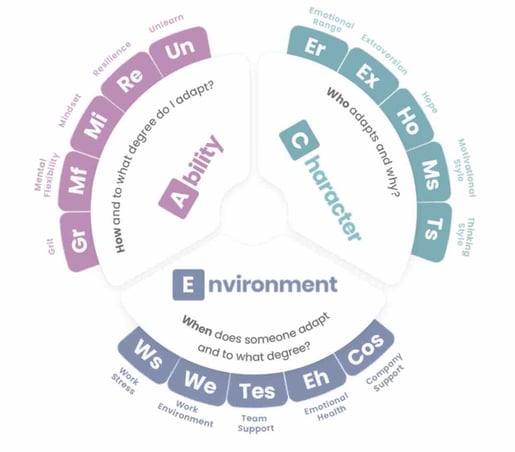From Rigidity to Resilience: The Transformation Power of Adaptability
By Lars Lin Villebaek.
In an ever-evolving world characterized by volatility, uncertainty, complexity, and ambiguity (VUCA), adaptability emerges not just as a skill but as a critical category of human capability. As a matter of fact, this calls for a reorganization of how skills have traditionally been categorized by organizations such as World Economic Forum, McKinsey and others. Have a look at the skill categories that are more relevant in the Age of AI over here https://educatefor.life/skills .
My favourite definition of adaptability is "the quality of being able to adjust to new conditions." -Lars Lin
This definition, in my view, encapsulates the essence of adaptability, highlighting its significance in the modern world. If you, like me, have a professional interest in “Human Development in a Tech World”, then Adaptability should be your preferred point for respawning, out of the 57 human skills we will study together in this blog (across at least just as many blog posts).
Understanding Adaptability
Adaptability refers to the ability to adjust to new environments and situations. It's about being flexible when things change unexpectedly. A person with high adaptability is often able to think on their feet and navigate new or unforeseen circumstances with ease. This quality is increasingly important in today's fast-paced, ever-changing world.
From the A.C.E. model described by AQai, and the upskilling resources found all around this Educatefor.life site, we learn that adaptability is not just about surviving changes but thriving in them. It involves a set of abilities, including:
- (Mental) Flexibility: The ability to pivot and adjust strategies or actions in response to new information or changing circumstances.
- Mindset: Understanding how mindset and self-belief impact our ways of adapting. Is change good or scary is somehow comparable to: is the rollercoaster ride thrilling or terrifying?
- Resilience: The capacity to recover quickly from difficulties and setbacks.
Adaptability as an over-arching skill category, spans over 3 categories, each with a group of sub-dimensions as illustrated here in the A.C.E. model:

Adaptability in the Workplace (Environment)
In the context of the workplace, adaptability is a game-changer. It’s about staying relevant and being able to evolve with the changing demands of the job market. A report by McKinsey & Company highlights the importance of skills like adaptability in the future world of work. It suggests that in the face of automation and technological advancements, soft skills, including adaptability, will become increasingly valuable.
At this point, it is important also to highlight the influence your work environment has on your personal abilities. When you adapt, and to what degree, is under significant influence by the environmental factors shown in the model above.
Character: From Constancy to Catalyst in Adaptability
Understanding the role of your character in your overall adaptability is crucial. Your character encompasses traits like emotional range, motivation style, and hope, which significantly influence how you respond to change. A person with a diverse emotional range can better handle the ups and downs of new situations. Similarly, your motivation style affects how you approach challenges and adapt to new conditions. Moreover, hope plays a pivotal role in maintaining a positive outlook during transitions. Collectively, these character traits shape not just your ability to adapt but also how effectively you transform challenges into opportunities for growth and learning. Rest assured, that you can develop your Character, if you wish to.
Why Adaptability is a Major Skills Category
While it's true that human skills can be categorized in various ways, adaptability stands out as a major category due to its comprehensive nature. It's not just a single skill but a cluster of competencies that enable individuals to respond effectively to change. This makes it a multifaceted and indispensable asset in both personal and professional realms. In a VUCA world, adaptability goes beyond mere survival; it is about being proactive, resilient, and agile in the face of change. This is why we propose Adaptability to feature as a top level skills category alongside other prominent categories such as Cognitive Skills and Interpersonal Skills. See the Skills site for the full list of categories and skills.
Cultivating Adaptability
Cultivating adaptability involves developing a mindset open to change and willing to learn and grow. It's about being comfortable with uncertainty and viewing challenges as opportunities for growth. This mindset, coupled with the relevant skills, can make a significant difference in how we navigate our careers and personal lives in an increasingly complex world.
In conclusion, adaptability is not just a skill but a vital skill category that encompasses a range of capabilities essential for success in today's world. As we face unprecedented changes and challenges, the ability to adapt will be key to not just surviving but thriving in the future.
Adaptability is a great place to start, when you consider assessing your skills and abilities. Since adaptability is a "muscle" that can be trained, there is always a roadmap to be built for your further personal and professional development.
Why not start with an Adaptabilty self-assessment, that covers all these 15 sub-dimensions?
You can start right here: https://educatefor.life/en/human-development-in-a-tech-world/aqme
or request an introduction call with an AQ Certified Coach here.
Enjoy your exploration of your Adaptability, that will transform you and your team from Rigidity to Resilience and true transformation agents!
Enjoy also this film "Adaptability and the Future of Work: Seeing The Invisible."